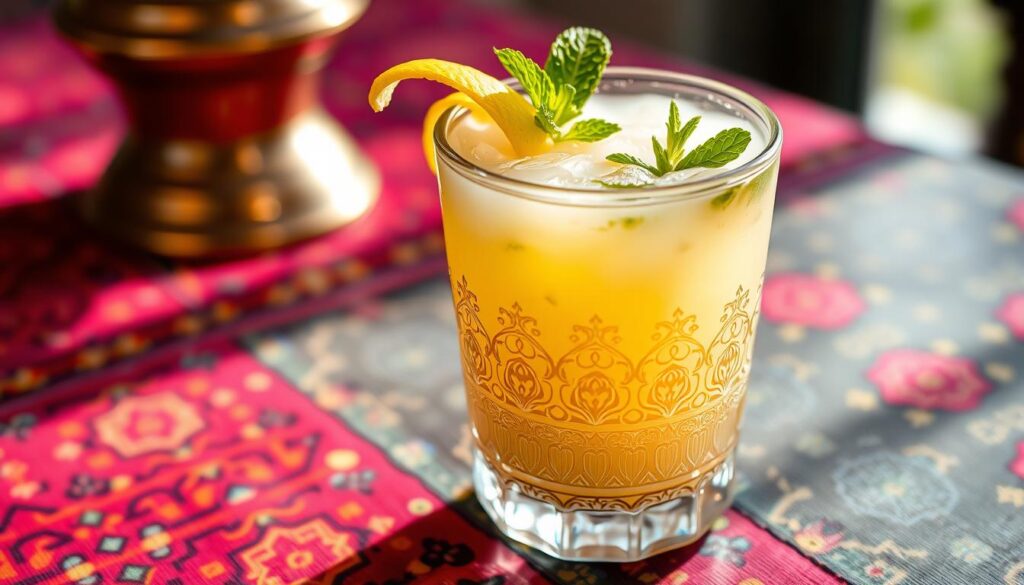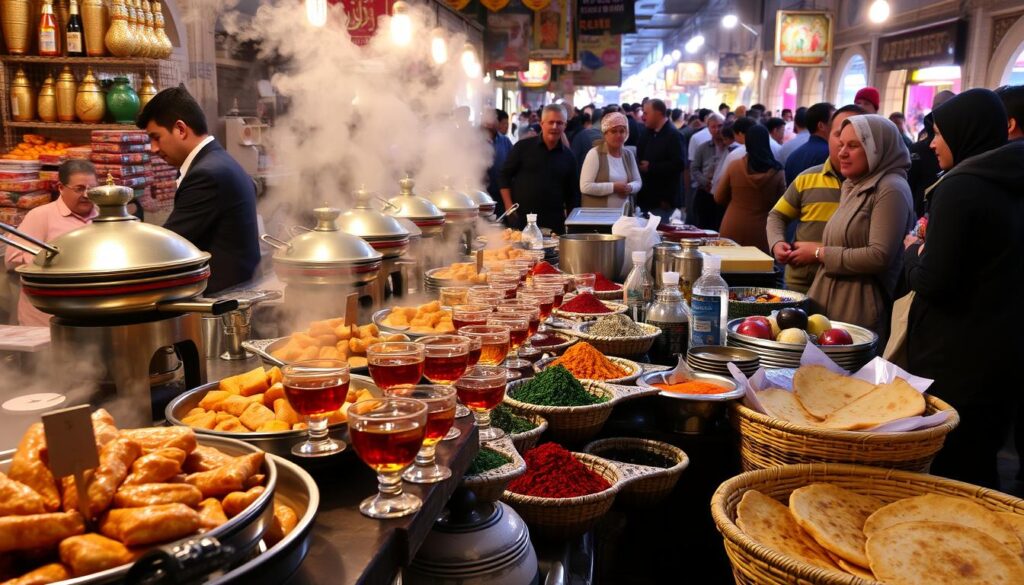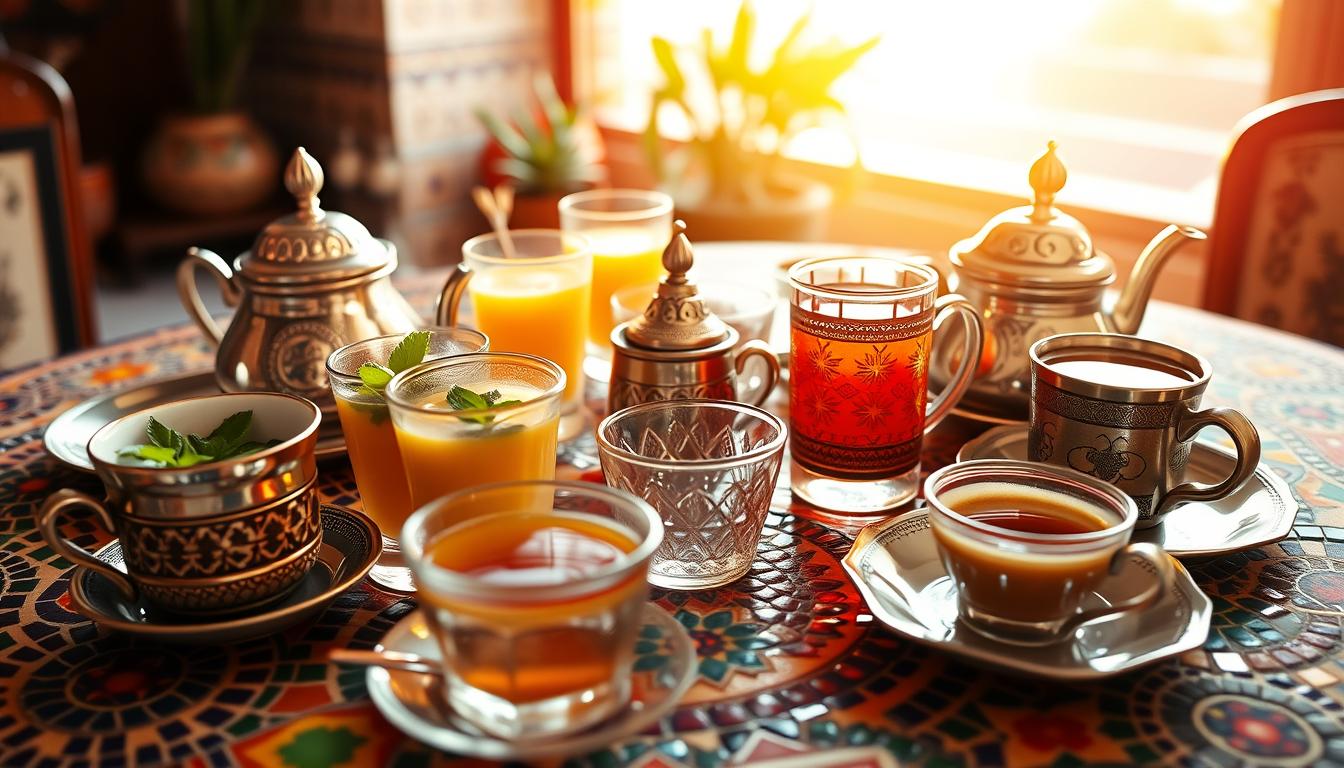As the sun rises over Morocco, the air fills with the smell of fresh drinks. These signal the start of a new day. Whether you need a refreshing drink or a soothing one, Morocco has a wide range of breakfast drinks. They capture the essence of this beautiful North African nation.
Key Takeaways
- Moroccan breakfasts feature a diverse range of refreshing beverages, from the iconic mint tea to freshly squeezed orange juice and aromatic coffee.
- These drinks play a central role in the country’s culinary culture, with each offering its own unique history, preparation methods, and cultural significance.
- Specialty beverages like black coffee and tea with milk are also popular options, while a variety of fresh juices, including pomegranate and watermelon, are commonly served.
- The breakfast menu often showcases traditional Moroccan ingredients and flavors, providing a distinct experience from Western breakfast traditions.
- Exploring the rich diversity of Moroccan breakfast beverages offers a glimpse into the country’s vibrant cultural heritage and culinary traditions.
Mint Tea: Morocco’s Signature Beverage
Mint tea is a big deal in Morocco. It’s loved by many and has been around for a long time. People call it “Moroccan whiskey” because it’s so special.
It’s a big part of daily life. It shows hospitality and brings people together. It’s a big part of Moroccan culture.
History and Cultural Significance
Moroccan mint tea has a long history. It’s made with green tea and fresh mint leaves. It’s a big part of Moroccan traditions.
It’s enjoyed at many events. From small family gatherings to big celebrations. It brings people together and makes them happy.
Brewing Techniques and Serving Rituals
Making Moroccan mint tea is a special process. First, the best green tea leaves are picked. Then, they’re rinsed to get rid of bitterness.
Fresh mint, like spearmint, is added next. The tea is then boiled to bring out the flavors. It’s poured into glasses from high up, making a frothy top.
Serving mint tea is an art. The host pours tea many times. Each pour is special and shows the host’s welcome.
“Mint tea is the glue that binds Moroccan social life together. It’s the first thing you’re offered when you visit someone’s home, and the last thing you have before you leave.”
Moroccan mint tea shows off the country’s rich culture. It’s enjoyed at meals, gatherings, and as a refreshing drink. It’s a big part of Moroccan life.
Freshly Squeezed Orange Juice
Morocco’s Citrus Bounty
Moroccans love their citrus, especially oranges. Fresh orange juice is a favorite breakfast drink. It shows the country’s rich agriculture and love for local foods.
Valencia and navel oranges make the best juice. It’s good to juice oranges three times a week. Blood oranges make pink juice, while clementines and tangerines are sweeter. Oranges are full of vitamin C, great for kids and adults.
Orange juice is acidic but turns alkaline in the body. Store it in the fridge for 2-3 days. Adding ginger, turmeric, or mint makes it even better. The orange pith is also full of fiber and nutrients.
| Nutritional Information (per serving) | Amount |
|---|---|
| Calories | 111 |
| Sodium | 2mg |
| Potassium | 349mg |
| Carbohydrates | 26g |
| Sugars | 20g |
| Vitamin C | 93mg |
Fresh orange juice is a tasty and healthy drink. It shows Morocco’s love for citrus. The vibrant colors and tangy flavors celebrate the country’s citrus riches.
Coffee: A Moroccan Morning Ritual
While mint tea is the national drink, coffee is also key in Moroccan mornings. Moroccan coffee is made in a special pot called a “dallah” or “kanaka.” It’s often flavored with spices like cardamom or cinnamon. This strong and tasty coffee is a big part of Moroccan life, bringing people together to chat.
Making Moroccan coffee is a careful process. First, the beans are roasted until they’re dark and smell amazing. Then, they’re ground finely, either by hand or with a traditional grinder. The ground coffee is simmered in the dallah with water and spices until it’s just right.
Coffee is not just for home in Morocco. It’s also a big deal in markets and cafes. Here, people enjoy the coffee and talk with each other. Whether at home or in a market, Moroccan coffee is a special tradition that shows the country’s rich culture and love for food.
| Barraquito: A Canarian Coffee Delight |
|---|
| Barraquito is a beloved coffee drink in the Canary Islands, especially in Tenerife. It’s made with condensed milk, Licor 43, whole milk, and coffee, topped with cinnamon and a lemon twist. The Bar Imperial in Santa Cruz de Tenerife has been serving it since 1961. It’s enjoyed during conversations after meals, midmorning, and sometimes for breakfast. |
Moroccans also enjoy modern coffee-making methods like cafetières and moka pots. These methods let people control the coffee’s strength and taste. Whether made the old way or with new gadgets, Moroccan coffee is a treasured part of their culture.
Recipes: Indulge in Flavors of Morocco
Moroccan cuisine is known for its rich and varied dishes, including breakfast. This section will share recipes for traditional Moroccan breakfasts and modern dishes that mix Moroccan flavors with international tastes.
Traditional Breakfast Dishes
Experience the real taste of Morocco with traditional breakfasts like baghrir (semolina pancakes), msemmen (flaky layered pancakes), and harcha (bready pancakes). These dishes highlight Morocco’s rich culinary history, using ingredients and methods passed down through generations.
Fusion and Modern Twists
Discover Moroccan-inspired fusion dishes that cater to many tastes and diets. From vegetarian and vegan to low-carb and Paleo-friendly, these recipes mix Moroccan spices with international flavors. They offer a unique and fulfilling dining experience.
| Traditional Moroccan Breakfast Dishes | Fusion and Modern Twists |
|---|---|
|
|
“Moroccan cuisine is a vibrant tapestry of flavors, traditions, and cultural influences, woven together to create a truly unique and unforgettable dining experience.”
Avocado Smoothies: A Healthy Start
Discover the vibrant flavors and health benefits of avocado smoothies, a favorite breakfast in Morocco. These creamy drinks are a great way to start your day. They offer a boost of vitamins, minerals, and healthy fats.
Avocado is the main ingredient, known for its smooth texture and rich nutrients. It’s packed with monounsaturated fats, fiber, and antioxidants. When mixed with milk or dairy-free options and a bit of honey or sugar, it creates a refreshing smoothie.
Adding ingredients like blueberries, spinach, or almond butter can make your smoothie even better. Blueberries add a tart taste that hides the avocado’s green color. Spinach and almond butter add more fiber, protein, and antioxidants for your skin.
Whether you like a simple avocado smoothie or a chocolate or high-protein version, they’re all great for a healthy start. Enjoy the flavors of Morocco and the health perks of this nutritious drink.
“Avocado smoothies are a refreshing and nutritious way to begin your day, offering a creamy texture and a host of essential vitamins and minerals.”
Araq: An Anise-Flavored Spirit
Araq is a traditional anise-flavored spirit in Moroccan cuisine and culture. It’s made from grapes or figs and flavored with anise seeds. People enjoy it as an aperitif or digestif, thanks to its unique licorice taste.
This spirit is deeply rooted in Moroccan history. It’s often served neat or mixed into cocktails. This adds depth and complexity to the drinking experience.
History and Cultural Significance
The history of Araq goes back to the 8th century. It’s said to have been created by Arab scholar Jabir Ibn Hayyen. Over time, Middle Eastern artisans perfected its production using alembic pots.
In Morocco, Araq symbolizes togetherness. It’s enjoyed at festivals, weddings, and family gatherings. This makes it a cultural centerpiece.
Today, Araq is still a source of pride in Moroccan homes. Families in remote villages make their own during winter. They keep the traditional methods and flavors alive. Mixologists worldwide have also discovered Araq, creating new cocktails that highlight its versatility.
“Araq, the ‘lion’s milk,’ as it is affectionately known, is a testament to the rich culinary heritage of Morocco, seamlessly blending tradition and modernity.”
Araq is a beloved part of Moroccan culture. Whether enjoyed neat or in cocktails, it offers a taste of Morocco’s vibrant history and culinary traditions.

Vegan and Vegetarian Options
Morocco’s food scene is now welcoming vegan and vegetarian choices. This change is seen in plant-based drinks. Moroccans love tea, but now, they also enjoy dairy-free and veggie drinks.
Plant-Based Beverages
The avocado smoothie is a hit among vegans. It’s made with avocado, plant-based milk, and a bit of honey or maple syrup. It’s a tasty way to start your day.
For a taste of Morocco, try the dairy-free mint tea. It lets health-conscious travelers enjoy the country’s famous tea without giving up their diet.
Moroccan mixologists are also trying new veggie juices and smoothies. They use local fruits and veggies like carrots, beets, and spinach. These drinks are full of nutrients and appeal to vegans, vegetarians, and health lovers alike.
| Beverage | Key Ingredients | Dietary Preferences |
|---|---|---|
| Avocado Smoothie | Avocado, plant-based milk, honey or maple syrup | Vegan, vegetarian, dairy-free |
| Dairy-Free Mint Tea | Fresh mint, green tea, plant-based milk | Vegan, vegetarian, dairy-free |
| Veggie-Based Juices and Smoothies | Carrots, beets, spinach, various fruits | Vegan, vegetarian, plant-based |
This section highlights the variety of plant-based drinks in Morocco. It’s for health-conscious travelers and those wanting to try more of Moroccan food. Whether you want a smoothie or Moroccan tea, there’s something for everyone.
Street Food and Market Finds
Dive into the lively world of Moroccan street food and markets. Here, you’ll find everything from mint tea to fresh juices. These places are a true taste of Moroccan culture.
Try the freshly squeezed orange juice for a refreshing drink. Or, enjoy the Moroccan mint tea, a drink full of history. For something more filling, try msemmen (flaky pancakes) or harira (lentil and lamb soup).
Moroccan street food also has new fusion dishes. You can find avocado smoothies for a healthy start or araq for a sweet treat.
There are also many vegan and vegetarian options. From plant-based beverages to savory pastries, Morocco’s food scene is diverse. Every dish tells a story of tradition and creativity.

Walking through Marrakech’s markets or Fes’ alleys, you’ll find amazing street food. It’s a chance to taste authentic Moroccan flavors. Enjoy the sights, sounds, and tastes that make Moroccan food so special.
Cooking Instructions: Mastering Moroccan Flavors
Exploring Moroccan cuisine is a journey into bold and complex flavors. It starts with understanding the key spices and ingredients. These include cinnamon, cumin, turmeric, preserved lemons, and olives. Cooking Moroccan dishes at home is a rewarding adventure for those who are patient and curious.
Essential Ingredients and Spices
Moroccan cuisine is built on a selection of spices that add depth to dishes. Saffron, with its golden color and floral taste, is crucial. Cumin and cinnamon, with their warm, earthy and sweet notes, are also key. Ras el hanout, a blend of up to 20 spices, is vital for Moroccan tagines and couscous.
Fresh, seasonal produce is also important in Moroccan cooking. Citrus fruits and mint add brightness to drinks and salads. Preserved lemons and olives bring a salty flavor to stews and tagines. Argan oil, with its nutty taste, enhances roasted vegetables and grilled meats with a Moroccan twist.

